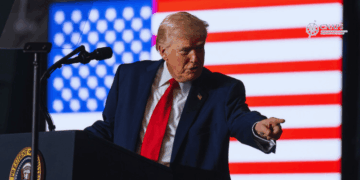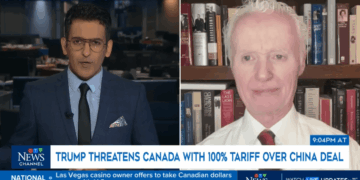This article originally appeared in Real Clear World.
By Anthony De Luca-Baratta, February 18, 2025
President Donald Trump’s announcement of a 25% tariff on all steel and aluminum imports is the latest of the administration’s threats to the Canadian economy. Canada’s response to these threats has been shockingly near-sighted. Instead of responding to Trump’s legitimate grievances, Canadians have mostly panicked and retaliated.
The president initially threatened a 10% tariff on Canadian energy imports, along with a 25% tariff on all other Canadian imports. In response, Prime Minister Justin Trudeau told Americans that the proposed tariffs would harm American jobs, raise the price of groceries and gas, undermine American national security, and violate the terms of the 2018 U.S.-Canada-Mexico free trade agreement.
Trudeau threatened the imposition of counter-tariffs on $155 billion of American goods. Provincial premiers mostly followed Ottawa’s lead, announcing a host of retaliatory measures against the United States, ranging from cancelling infrastructure contracts with American companies to removing American liquor from Canadian store shelves.
The prime minister and his provincial counterparts said everything except the thing that actually ended up stopping the nascent trade war in its tracks: addressing the administration’s stated grievances. In a post on X announcing the new tariffs, the White House cited the production of fentanyl on Canadian soil and its trafficking across the U.S.-Canada border as immediate concerns. Sure enough, Trudeau struck a deal with Trump to halt the proposed tariffs for thirty days in exchange for enhanced Canadian commitments to secure the border and crack down on the fentanyl trade.
Unlike the transactional approach that stayed Trump’s hand – at least for now – Canada’s initial strategy seemed premised on Trump being a bully needing to be put in his place rather than a businessman with a goal. Nobody wanted to admit that Canada and the United States are, to put it mildly, in different weight classes.
The Canadian economy is less than one tenth the size of America’s. No amount of grandstanding can change that. One analysis warned that Trump’s tariffs could throw the Canadian economy into a recession. Ottawa had no choice but to strike a deal to halt a trade war that it never could have won.
The futility of Canada’s initial approach to the Trump administration’s threats are compounded by a fact that no Canadian seems to want to face: many of Trump’s criticisms of Canada are legitimate. For instance, Trump has long lamented Canada’s protectionist trade policies. Canada has a national supply management system that regulates the production, sale, and pricing of poultry, eggs, and dairy products. Imports of these items from the United States are subject to quotas and tariffs. From Trump’s perspective, there is simply no good reason for American farmers to be subsidizing a welfare program for Canadian farmers.
Trump also recently asked Trudeau to lift the prohibitions preventing American banks from operating in Canada. I could go on. A Fraser Institute study found that roughly one third of the Canadian economy is protected from foreign competition. Canada simply cannot position itself as the defender of free trade under these circumstances.
Then there is the sorry state of the Canadian military, another sticking point for the American president. From our spending to our readiness to our lagging recruitment numbers, the Canadian Armed Forces are in a state of disrepair. Justin Trudeau can wax poetic about Canadians and Americans standing side by side “from the beaches of Normandy to the mountains of the Korean Peninsula, from the fields of Flanders to the streets of Kandahar”, but the Canada that disproportionately pulled its weight in the military arena is long gone. Ottawa knows this as much as Washington, which is why everyone from Liberal leadership candidates Mark Carney and Chrystia Freeland to Opposition leader Pierre Poilievre have come out in favor of massive increases to Canada’s defence spending.
There is a new dawn in Washington. Transactionalism and unapologetic self-interest are back. Donald Trump wants to see an end to the fentanyl trafficking that is killing far too many people on both sides of the border. He wants a trading relationship with Canada that is actually reciprocal. He wants Canada to pull its weight in continental defence. All of these things, it must be noted, are also in Canada’s best interests.
Ottawa has a choice: smarten up or wade headlong into a trade war that it is guaranteed to lose.
Anthony De Luca-Baratta is a contributor to the Center for North American Prosperity and Security at the Macdonald-Laurier Institute. He is based in Washington, DC.








